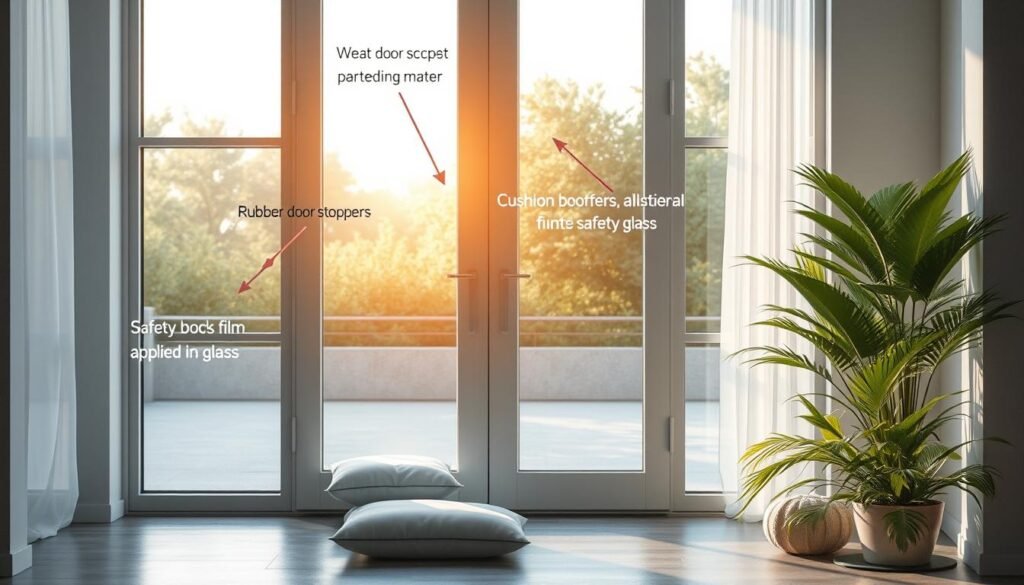Slamming doors can be a big problem in homes and offices, especially in busy places like Singapore. Glass doors look nice but can slam shut when air moves through. This can damage the door and even hurt people.
It’s important to know the dangers of slamming doors to keep them safe. We’ll look at ways to stop doors from slamming. There are many solutions, from easy fixes to special products, to make your glass doors work better and safer.
Understanding the Causes of Slamming Doors
Slamming doors can be a big problem in homes. It often happens because of door imbalance. This makes doors hard to close smoothly or stay open.
Loose hinge pins are another big reason for slamming doors. When these pins get loose, doors swing more and slam shut. Wind can make this worse, causing doors to shut suddenly.
Weather changes and air pressure also play a role. These can make doors slam by creating a “stack effect” in buildings. This effect makes air rush in or out, forcing doors to shut fast.
It’s important to find out why doors slam to stop it. Here are the main reasons:
| Causes of Slamming Doors | Description |
|---|---|
| Unbalanced Door | A door that is not properly aligned in its frame can swing or slam unexpectedly. |
| Loose Hinge Pins | Loose pins allow the door to move too freely, making it prone to slamming. |
| Windy Conditions | Strong winds can push doors closed abruptly, leading to slamming. |
To stop doors from slamming, we need to fix these problems. We can adjust hinges, use door closers, or add weather stripping. These steps can help keep doors safe and prevent slamming.
Door Imbalance and Uneven Hanging
Fixing door imbalance and uneven hanging is key to keeping glass doors working right and safe. Doors that don’t hang evenly can slam shut easily. This problem often comes from installation issues, like doors not being set up right or not having enough support.
Poor installation can cause doors to shut too fast, which is dangerous. It’s important to check if the floor or foundation is even. Also, the design and how heavy the door is can make slamming worse. Heavier doors need stronger support to work well.
To solve these problems, check the door’s alignment when you install it. Using door closers can help control how doors shut and stop slamming. Keeping doors in good shape and making adjustments as needed helps them last longer and work better.
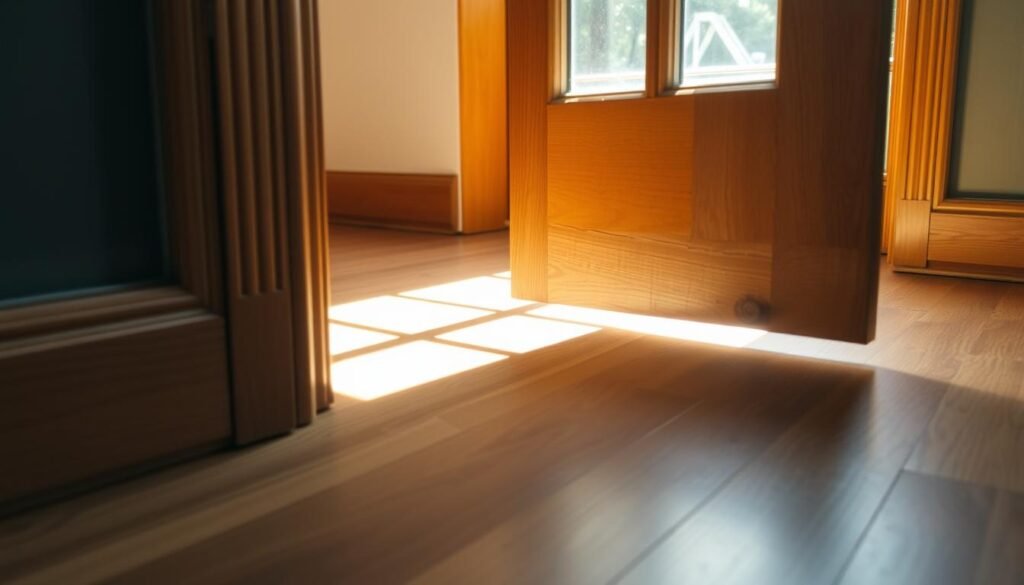
| Factor | Impact on Door Performance |
|---|---|
| Door Imbalance | Increases risk of slamming and potential damage |
| Uneven Installation | Leads to misalignment and abrupt closures |
| Flooring Issues | Affects door operation due to structural changes |
| Weight Distribution | Influences closure force and overall stability |
Knowing about these factors is crucial for homeowners and builders. It helps ensure glass doors operate safely and avoid slamming. Regular checks and proper installation can greatly improve your doors’ performance.
Loose Hinge Pins and Improper Installation
Loose hinge pins can cause doors to move strangely, leading to slamming. This is a safety risk. In Singapore, where it’s humid, keeping doors well-maintained is key. This is especially true for doors installed incorrectly.
Knowing your door type is important. Whether it’s wood, metal, or fiberglass, each needs different care. Good hinges make doors work better and keep them secure. Regular checks can stop squeaks and misalignments.
Regularly checking for loose hinge pins is crucial. Tightening them makes doors more stable. This reduces slamming risks. Ignoring this can cause big problems, especially in homes where air flow is a concern.
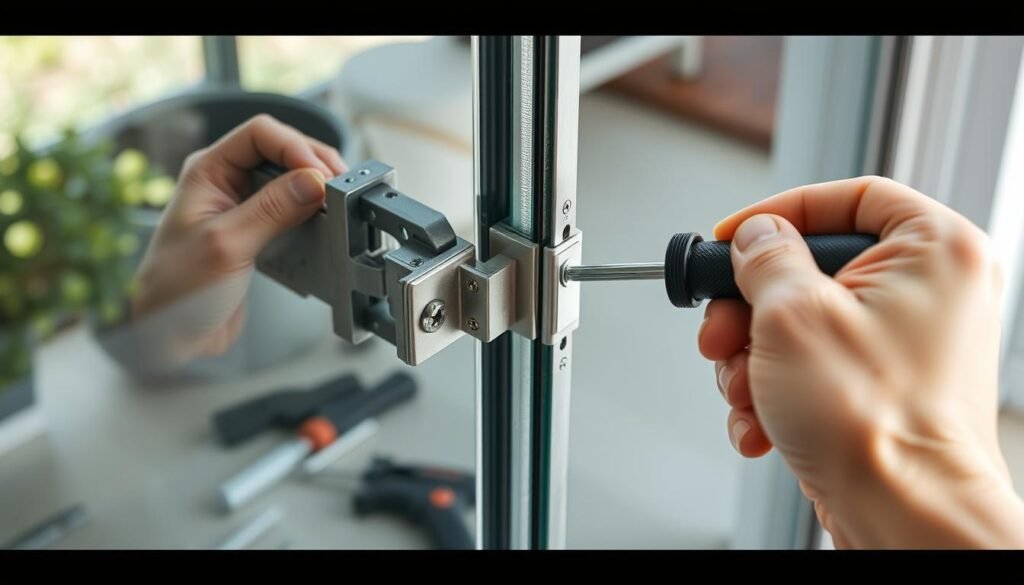
Checking and maintaining hinges is worth the effort. It stops doors from moving too much and makes them last longer. Fixing loose pins not only stops slamming but also keeps families safe, especially those with young kids.
Weather Conditions and Air Pressure Changes
Strong winds or sudden air pressure changes can make doors slam shut. This is dangerous and can damage your home. It’s important to know how these changes affect doors to prevent slamming.
Air pressure changes can cause drafts, making doors move or slam. This happens when nearby windows or doors are open. Sharp temperature differences inside and outside also increase the risk of slamming.
To fight these weather effects, you can try a few things:
- Close all windows when winds pick up to minimize pressure shifts.
- Ensure proper installation of doors to prevent air leaks that can exacerbate slamming.
- Apply felt pads or foam weather stripping around door edges. These cushioning materials can lessen the impact of doors closing and reduce slamming noise.
- Consider installing pneumatic door closures. These devices can control the speed of door closure, significantly reducing the chances of slamming.
It’s key to understand how weather and door behavior are linked. By knowing how air pressure changes affect doors, you can take steps to prevent slamming. This makes your home safer and quieter.
| Prevention Method | Description | Effectiveness |
|---|---|---|
| Felt Pads | Cushions the edges of doors to prevent slamming. | High |
| Pneumatic Closers | Controls door closure speed to avoid slamming. | Very High |
| Weather Stripping | Seals gaps around doors, reducing drafts. | Moderate |
| Doorstops | Prevents doors from swinging fully and slamming. | High |
Checking for Warped or Irregular Glass Doors
Homeowners should check their doors carefully for any problems. Warped glass doors or irregular shapes can cause doors to slam. This can damage the door over time.
Signs of warping include visible distortions and gaps. These gaps can weaken the door. It’s important to check the door frame too. Sometimes, problems aren’t easy to see.
- Distortions in the glass or frame
- Cracks or splits in the material
- Swollen panels due to moisture
- Gaps where air passes through
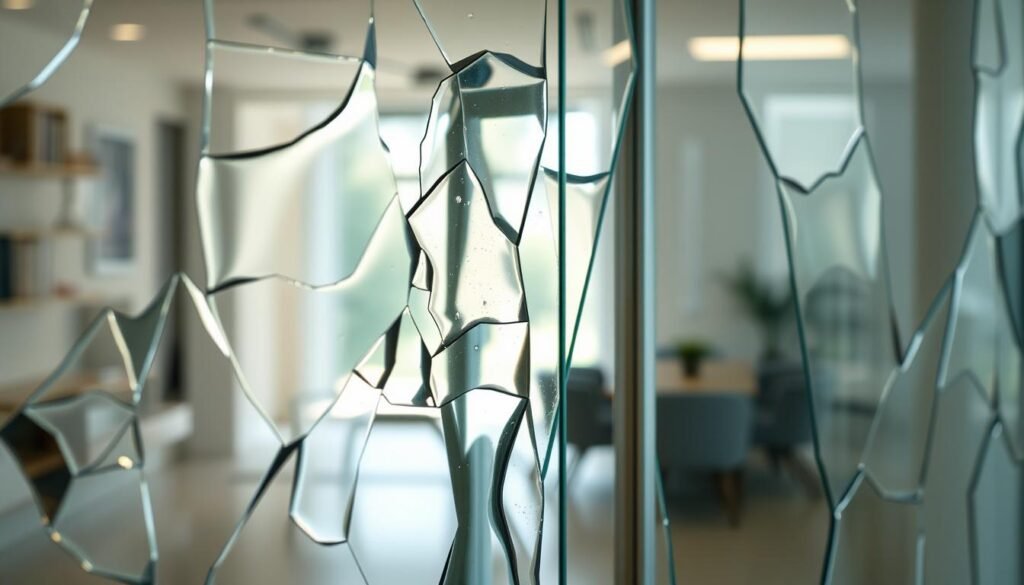
Fixing these problems early can stop bigger issues later. Regular checks are key. By staying alert, homeowners can fix problems before they get worse. This keeps homes safe and working well.
| Type of Damage | Signs |
|---|---|
| Warped Glass Doors | Visible distortions |
| Irregular Door Shapes | Gaps in frame |
| Moisture Damage | Swollen panels |
| Cracks | Splitting or cracking |
By doing a door check early, you can make your glass doors last longer. This keeps your home in good shape.
Prevent Slam on Glass Doors: Effective Solutions
Fixing door slams needs a mix of practical steps to make your space more comfortable and safe. You can use door cushioning solutions or adjust the door’s setup. These methods help soften impacts, cut down on noise, and protect your door’s frame.
Using Felt Pads and Foam Strips
Felt pads and foam strips are great for cushioning doors. You can put them on the door frames or walls near the door. They absorb shock when the door closes, reducing noise and preventing damage.
For heavier doors, foam strips work better because they’re sturdier. They offer more effective cushioning than felt pads.
Tightening and Adjusting Door Hinges
Regular upkeep is key to stopping door slams. Adjusting the door hinges can fix many alignment problems that cause slamming. Tightening loose screws on the hinges can make the door more stable and aligned.
A well-adjusted door hinge stops gaps that lead to slamming. This reduces loud noises when closing the door.
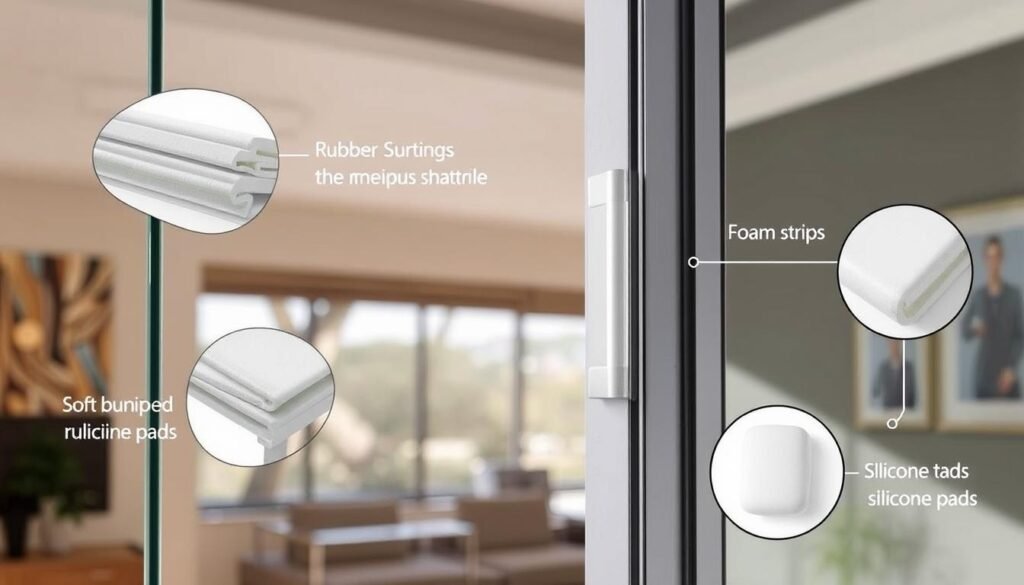
| Solution | Benefits | Best For |
|---|---|---|
| Felt Pads | Softens impact, reduces noise | Lightweight doors |
| Foam Strips | Sturdier cushioning, long-lasting | Heavy doors |
| Door Hinge Adjustment | Improves alignment, prevents slamming | Any door type |
Installing Hydraulic or Pneumatic Door Closers
Installing hydraulic or pneumatic door closers helps prevent slams on doors. These closers close doors gently and securely. They use pressure from hydraulic fluid or air, making them reliable for many settings, especially glass doors.
Choosing between pneumatic and hydraulic closers depends on their differences. Pneumatic door mechanisms are cheaper upfront, appealing to those watching their budget. On the other hand, hydraulic door closers last longer and offer better value over time. They can be adjusted for speed and force to meet specific needs.
Hydraulic systems come in various strengths for different door sizes and weights. They range from small pool gates to large commercial doors. Brands like Lawrence Hardware offer warranties of 10 to 30 years, showing their durability.
| Feature | Pneumatic Door Closers | Hydraulic Door Closers |
|---|---|---|
| Cost | Lower initial cost | Higher initial cost but longer lifespan |
| Durability | Less durable | More durable, typically longer lasting |
| Adjustability | Limited adjustability | Adjustable closing force, speed, and latching action |
| Maintenance | Simple maintenance | Complex maintenance due to intricate mechanisms |
| Warranty | Varies | 10 to 30 years |
It’s important to have these closers installed by professionals for safety and function. Proper installation avoids potential liabilities. Brands like GEZE provide installation videos and FAQs to help technicians.
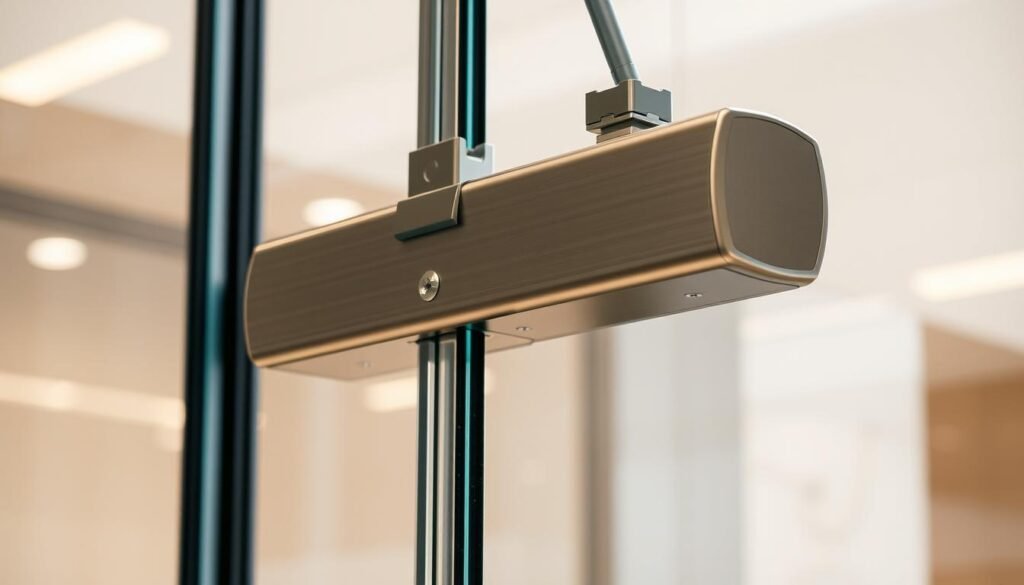
Using the right closers and professional installation boosts safety and prevents slams. Investing in quality hydraulic door closers ensures smooth operation and a safer space for everyone.
Weatherstripping for Better Door Sealing
Keeping your home comfortable is key. Weatherstripping helps by stopping air leaks that can mess with air pressure. This can make doors slam shut unexpectedly. Using the right door sealing solutions can help avoid this.
There are many types of weatherstripping, like EPDM, PVC, and Silicone. Each has its own strengths, like lasting a long time and handling extreme temperatures. They can handle temperatures from -80 to 280 degrees, fitting all kinds of weather.
How you install weatherstripping matters a lot. Making sure it’s aligned right and pressed down hard makes it work better. Here’s how to do it right:
- Clean the area where you’ll put the weatherstripping.
- Measure and cut the weatherstripping to the right length.
- Remove the backing and stick it to the door frame firmly.
- Check if there are any gaps and adjust if needed.
Doing this well not only helps control air pressure but also makes your door work better. It stops air from leaking, making your home more energy-efficient. This also keeps your home comfortable by stopping sudden temperature changes.
| Material | Temperature Resistance | Durability |
|---|---|---|
| EPDM | -80 to 280 degrees | High |
| PVC | -25 to 120 degrees | Medium |
| Silicone | -60 to 250 degrees | Very High |
Adding these door sealing solutions to your home makes it quieter and more energy-efficient. This improves your comfort a lot.
Benefits of Using Door Stoppers
Door stoppers are great for stopping glass doors from slamming. They make places safer and more convenient. These accessories protect walls and furniture from door damage.
They also make places quieter by reducing the noise when doors close. This is true for both homes and businesses.
In homes with kids, door stoppers are key to preventing injuries. They keep fingers and hands safe from doors. You can find many designs, from sleek metal to fabric, each with its own purpose.
Door stoppers also help save energy by keeping doors in place. This stops energy from being wasted when heating or cooling. They also help with airflow, making indoor spaces more comfortable in warm weather.
These stoppers are great for keeping doors stable in windy areas. They prevent damage and make spaces more accessible.
- Available in various materials:
- Shock-absorbing options for lightweight doors like glass
- Kick-down door holders for easy monitoring
- Magnetic stoppers that secure doors without damaging floors
Getting door stoppers is a smart move for any place. They protect your space from damage and meet ADA standards. For more on their benefits, check out this guide on door stoppers.
| Type of Door Stopper | Features | Ideal Use |
|---|---|---|
| Shock-Absorbing | Soft materials like silicone, reducing noise | Glass doors, lightweight doors |
| Kick-Down Holder | Secures door in place, easy access | Commercial settings for traffic flow |
| Magnetic Stopper | No screws needed, easy installation | Prevents doors from slamming |
| Fabric Stopper | Sandbag-like, discreet | Home use to prevent furniture damage |
| Wall-mounted | Protects walls from damage | Heavy doors, entry areas |
Conclusion
Keeping glass doors safe is key for a cozy home. We’ve seen many ways to stop doors from slamming. For example, the TS 5000 SoftClose improves door use and is a smart choice for homes.
Homeowners gain a lot by fixing slamming doors. They get quieter homes, better office work, and save on repairs. Automatic door closers help control who enters and keep noise down, making homes calmer.
Fixing slamming glass doors is about making homes safe and stylish. Using devices like the Salvadita or advanced closers does just that. They make homes both useful and beautiful.
FAQ
What are common causes of slamming glass doors?
How can I prevent my glass doors from slamming?
Why is it important to maintain my door hinges?
How do weather conditions affect door slamming?
What should I look for when inspecting my glass doors?
Are there specific door closers you recommend?
What materials are best for weatherstripping my doors?
What types of door stoppers are available?
Source Links
- https://www.aspire-doors.co.uk/external-doors/external-front-doors/advice/9-ways-to-keep-your-front-or-patio-door-from-slamming
- https://www.emeralddoors.co.uk/blogs/news/how-to-stop-doors-slamming?srsltid=AfmBOopQQ-tkzoi3qsqLmXlz-EXpeOs10PCpfwBUXxPLO2I9dSLSX9eO
- https://www.tmhardware.com/blog/how-to-stop-someone-from-slamming-a-door?srsltid=AfmBOopATJj0VGtP9dXL6V_-jItpVdQCh26HmeZ8xiC1UH9xKSDOOxxU
- https://glassdoorspecialist.com/prevent-glass-door-slamming-easy-solutions/
- https://www.greenmatch.co.uk/blog/stop-door-slamming-shut
- https://www.clerawindows.com/blog/stop-door-from-slamming
- https://pinkysirondoors.com/blogs/news/your-pivot-door-options-choosing-the-right-pivot-door?srsltid=AfmBOor3Sk9jrALpKwxsemoaCtMVOQRnrXjuKLO28rh1kYmt9irt9FrJ
- https://localsgengineering.com/door-hinge-repair/
- https://www.hiatt-hardware.com/blog/post/how-to-stop-a-door-from-slamming
- https://perfectglazing.uk/stop-upvc-doors-slamming/
- https://colnevalleywindows.co.uk/how-to-stop-doors-from-slamming/
- https://www.bobvila.com/articles/doors-slamming/
- https://www.valuedoors.co.uk/advice/stop-door-slamming/
- https://www.apeer.co.uk/blog/common-composite-door-problems/
- https://watersonusa.com/solutions/weighted-door-closer
- https://www.griffwerk.de/en/blog/doors-close-quietly/
- https://watersonusa.com/solutions/stopdoorslamming
- https://www.homebuildershardware.com/pneumatic-vs-hydraulic-door-closers/?srsltid=AfmBOoqUa0sLx76YBe9T_nUXQxO8FX2K-6LhqVNG41oyjwtubHP_PqUP
- https://www.geze.sg/en/discover/product-knowledge/correctly-setting-door-closers
- https://www.amazon.sg/SameTech-Weather-Stripping-Door-Seal/dp/B0CNNYG1WT
- https://tianjinwortai01.en.made-in-china.com/product/tvMnqQeCYLpu/China-Weather-Strip-EPDM-Rubber-Seal-Gasket-for-Window-and-Door.html
- https://www.griffwerk.de/en/blog/door-stopper-guide/
- https://www.cdfdistributors.com/6-surprising-benefits-of-a-door-stop/
- https://www.tmhardware.com/blog/door-stoppers-continued?srsltid=AfmBOorvLURT8EV59Rsqt-U71-z9FO-rkVHDaZrUgnDcok3bbMtxPDvH
- https://www.geze.sg/en/discover/product-knowledge/secure-and-quiet-the-ts-5000-softclose
- https://www.avantisystemsusa.com/automatic-sliding-door-closer/
- https://zeroplus.co.uk/blogs/know-your-door-hardware-blog-by-zeroplus/prevent-hand-finger-crushing-accidents-with-a-door-anti-slam-device?srsltid=AfmBOopSL4CvQ0e9hGtJ9ApsZiq2cRa85lFZuUyicBsTJDAALUFtGYri

